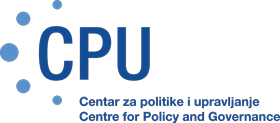Lejla Dragnic is a CPU Economic Advisor. She has over 30 years of experience in research, management and consulting in a wide range of applied economics such as macro-economic policies, development and reconstruction strategies, international economic relations, market reforms and private sector development. Since 1996 she has worked as a senior adviser, program manager and consultant in areas of privatization and SME development on regional and national projects supported by various organizations (USAID/Price Waterhouse Coopers, World Bank/IFC, EC, SDC, GTZ, ADA, SIDA). More recent professional experience includes assessment of the macro-economic conditions and budgetary processes in BiH; assessment of the value chain constrains for improving selected sectors’ competitiveness in BiH; labor market policies, evaluation of various internationally supported projects in the field of private sector and SME development. Lejla has a Master of Science in Economics.
Goran Dostic is a CPU Senior Researcher and Economic Policy Advisor. He has twelve years of professional experience in design, drafting, implementation and advocacy of public policies in the area of development strategy, public finances, fiscal policy, European integrations, human capacity development, and improvement of the public administration. Goran’s work experience includes consulting and research positions in the World Bank as a consultant within the Poverty Reduction Strategy Paper project in BiH; Research Associate with UNDP; Consultant for the project of the local property tax administration for GTZ; Advisor for the DFID project of strengthening the public finance management in BiH and consultant for the European Commission project of improving the local institutions capacities in the sphere of econometrics and statistics. Goran has also several years of experience in Canada as financial analyst in the private sector. He is the author of various research publications and papers. Goran has a PhD Degree in Economics.
Asja Cengic-Kasumovic is External Associate Communication Consultant with fifteen years of experience in nongovernmental sector and international community. She started her cooperation with the Centre in June 2012 planning and implementing outreach and media activities for the “Road to Recovery” high level conference, and she held CPU Executive Director position until end of May 2014. Asja is also Independent Communications Consultant. Previously she worked for more than five years as Communications Analyst and Spokesperson of the United Nations Development Programme in Bosnia and Herzegovina. Before she joined UNDP, she worked as Head of PR Communications Department at the High Judicial and Prosecutorial Council. Cengic has also worked as PR-Manager/Spokesperson for the Sarajevo Film Festival and as Regional PR/Information officer at the Office of the High Representative. She holds a Bachelor in Business Administration, completed at the Anglo-American University in Prague and M.A. in Communications at University Singidunum, Belgrade.
Amra Hasagić was working as Researcher at the Centre for Policy and Governance. She wrote policy papers and conducted researches on projects underway. She is external associate at the moment. She holds BSc degree with honors in Economics from Sarajevo School of Science and Science and Technology (SSST) and from the University of Buckingham. She was engaged on various projects, some of which are internships at the Hayek Institute in Vienna, in the Central Bank of Bosnia and Herzegovina, at the Public Administration Reform Coordinator’s Office. She volunteered at Sarajevo Business Forum from its first year and was working as the teaching and Dean’s assistant at SSST. As a DAAD (German Academic Exchange Service) scholarship holder she is doing master studies in Agricultural Economics at the University of Hohenheim in Germany.
